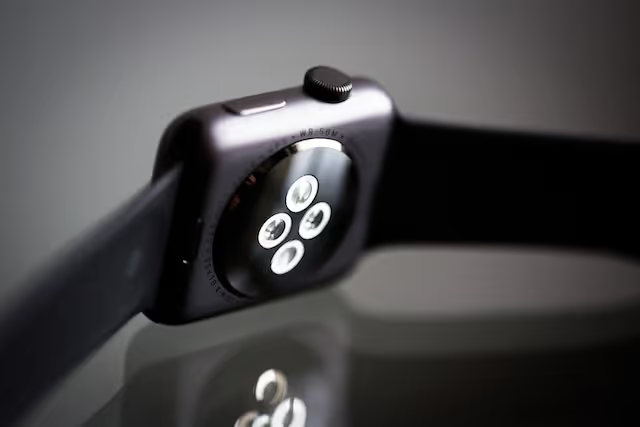
Blog
Wearables and Healthcare: The Future of Wellness
The health tech revolution: are wearables the future of healthcare?
Ever since the introduction of Fitbit in 2008, wearable technology has rapidly evolved, transforming the way individuals monitor and manage their health. These modern wearables are not just about counting steps anymore; they are capable of capturing granular measurements that could potentially revolutionise mainstream healthcare.
The Economist has highlighted three key reasons why wearables have the potential to take healthcare to the next level:
- Early diagnosis,
- Personalised treatment, and
- Managing chronic diseases.
However, there are challenges to address, particularly regarding data privacy and security, before wearables become an integral part of everyday treatment.
What’s all this got to do with your finances? … Everything! Health and wealth are closely linked, there’s no point being wealthy if you don’t have your health to enjoy it. This topic also relates to areas such as health insurance, which is a speciality of ours.
Early Diagnosis
Wearable devices are proving to be powerful tools in enabling early diagnosis for a range of conditions. For example, the Oura ring can predict menstrual cycles, and Whoop has reportedly been successful in detecting early signs of COVID-19 by monitoring respiratory rate data. In the future, wearables could expand their capabilities to include a wider spectrum of psychological and physical diagnoses. With more sophisticated sensors and advanced algorithms, wearables could alert individuals and healthcare providers about potential health issues at an earlier stage, allowing for timely interventions and better health outcomes.
One study published in the journal Nature Medicine found that wearable devices can be used to detect early signs of depression. The study found that wearables that track sleep, activity, and heart rate data were able to identify people who were at risk of developing depression before they showed any symptoms. This early detection could help people get the treatment they need sooner and could prevent the development of more serious health problems.
Personal Insurance
Closer to home, here in New Zealand, AIA Vitality is a health and wellness programme that rewards people for making healthier lifestyle choices. The programme uses wearable devices to track activity, sleep, and heart rate data. This data is used to provide personalised feedback and rewards to help people stay motivated and on track with their health goals.
If you’d like to discuss whether AIA Vitality might suit you, please get in touch.
Personalised Treatment
One of the most promising aspects of wearable technology is its potential to personalise medical treatments. A leading example is Levels, which combines a continuous glucose monitor with a smartphone app to track the impact of an individual's diet on their blood sugar levels. This data empowers users to make informed dietary choices. In the future, wearables could go beyond food tracking and provide insights into how specific medications interact with an individual's unique physiology. This information could help healthcare professionals tailor treatment plans that are highly effective and have fewer adverse effects.
Research
The University of Auckland is currently conducting a study to investigate the use of wearable devices to personalise treatment for people with type two diabetes. The study uses wearable devices to track activity, sleep, and blood sugar levels. The data from the wearable device is being used to develop personalised treatment plans for participants in the study.
Related article: Never cancel health insurance
Managing Chronic Diseases
Wearable devices have already demonstrated their utility in managing chronic diseases. Simple step-counting has proven beneficial for patients with chronic heart disease, while continuous glucose monitors have been invaluable in helping people with diabetes monitor their blood sugar levels. In the future, wearable technology may also contribute to the management of conditions like dementia and Alzheimer's disease. By continuously tracking vital signs and cognitive performance, wearables could assist in early detection and improve the quality of life for those with neurodegenerative conditions.
New Zealand Ministry of Health
Our very own Ministry of Health is currently developing a national wearable technology strategy, which reportedly aims to promote the use of wearable technology to improve the health and wellbeing of New Zealanders. The strategy is still in its early stages, but it is expected to be released in the next few years.
Of course, with all this data at stake and trust in government and institutions at all-time lows after the pandemic, data security and management concerns will need to be addressed. Even if it’s just to avoid the perception of ‘big brother’ looking over all our shoulders.
The Bottom Line: Wearables and Healthcare
The promise of wearables in healthcare is immense. With their potential for early diagnosis, personalised treatment plans, and improved management of chronic diseases, wearables could revolutionise the way we approach health and wellness. However, addressing issues related to data privacy and establishing a supportive regulatory framework are crucial steps in harnessing the full potential of wearable technology in healthcare. As these challenges are overcome, wearables will undoubtedly become an indispensable part of the modern healthcare landscape.
You may also like:

What to Do When Your Investment Value Falls

Insurance Advisers Can Ensure You Get a Big Payout


